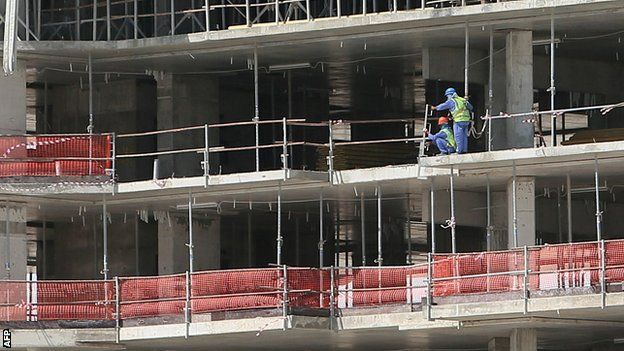Qatar 2022: Plans to protect World Cup workers unveiled
- Published

Organisers of the 2022 World Cup in Qatar have published a 'Workers' Charter' in an attempt to protect the rights of migrant employees.
Almost 200 Nepalese men are reported to have died last year working on construction projects in Qatar.
The new 50-page document has been developed in conjunction with the International Labour Organisation.
However the International Trade Union Confederation (ITUC) says its proposals do not go far enough.
Qatar had until 12 February to inform football's world governing body, Fifa, how it would reform working practices.
Fifa had been pushing the 2022 World Cup hosts for reform following criticism of the Gulf state's conditions for migrant workers.
As well as 185 deaths last year, it is believed a significant number of workers in Qatar suffered injuries as a result of unsafe working practices.
There have also been complaints about the standard of accommodation many workers live in.
Many of the migrant workers in Qatar come from South Asia
Trade unions and human rights groups have also criticised Qatar's 'kefala' employment system that ties migrant workers to their sponsor companies and the exit visa requirements that prevent workers from leaving without the permission of employers.
The new document, entitled 'Workers' Welfare Standards', details the measures that Qatar's World Cup Supreme Committee plan to enact when dealing with contractors and subcontractors over key World Cup stadium and infrastructure projects.
The supreme committee said its principles will be "robustly and effectively monitored and enforced for the benefit of all workers".
Among its actions, the charter will force employers to:
Install a telephone hotline for workers to raise grievances and report concerns
Grant workers a minimum of three weeks' paid annual holiday based on a 48-hour week that cannot exceed eight hours per day
Guarantee workers a rest day or compensate them; and create welfare officer posts as well as a forum for grievances to be resolved.
However the ITUC, which claims up to 4,000 workers could die by 2022 if current laws and attitudes persist, has criticised the new charter as "a sham" that will not protect workers' rights.
General secretary Sharan Burrow added: "These standards are built on an old, discredited self-monitoring system which has failed in the past in Bangladesh and other countries where thousands of workers have died."
Last year Qatar issued 10 guiding principles that form the backbone of the new 50-page charter:
Health and Safety - foster and actively encourage a world-class health and safety culture
Employment Standards - comply with the Supreme Committee's required employment standards and all relevant Qatari laws
Equality - treat all workers equally and fairly, irrespective of their origin, nationality, ethnicity, gender or religion
Dignity - ensure that workers' dignity is protected and preserved throughout their employment and repatriation
Unlawful Practices - prohibit child labour, forced labour, and human trafficking practices
Working and Living Conditions - create and maintain safe and healthy working and living conditions
Wages - ensure that wages are paid to workers on time
Grievances - prohibit retaliation against workers who exercise any rights deriving from the Supreme Committee's required employment standards or relevant Qatari laws
Access to Information - provide access to accurate information in the appropriate language regarding workers' rights deriving from the Supreme Committee's required employment standards or relevant Qatari laws
Training - provide workers with training on skills necessary to carry out their tasks, including areas related to health and safety.
Hassan Al-Thawadi, the secretary general of Qatar's supreme committee for the World Cup, has insisted the tournament would not be built "on the blood of innocents".
Andrew North reports from Nepal on the plight of migrant workers
After clarifying in October that Qatar would still host the World Cup, Fifa president Sepp Blatter promised to address the issue of workers' rights and visited the Emir of Qatar to discuss the matter.
Zahir Belounis, the French Algerian striker who was unable to leave Qatar after a dispute with his club, is due to address the European Parliament on Friday about his experience.
A senior member of Fifa's executive committee, Theo Zwanziger, is also expected to deliver an update on Qatar's planned reforms at the hearing in Brussels.
Qatar is reported to be spending more than $200bn (£121bn) on a series of infrastructure projects, and says the World Cup is a catalyst for a nationwide building project.
- Published27 November 2013
- Published18 November 2013
- Published18 November 2013
- Published17 November 2013
- Published3 October 2013
- Published27 September 2013
- Published26 September 2013
- Published6 December 2013
- Published7 June 2019